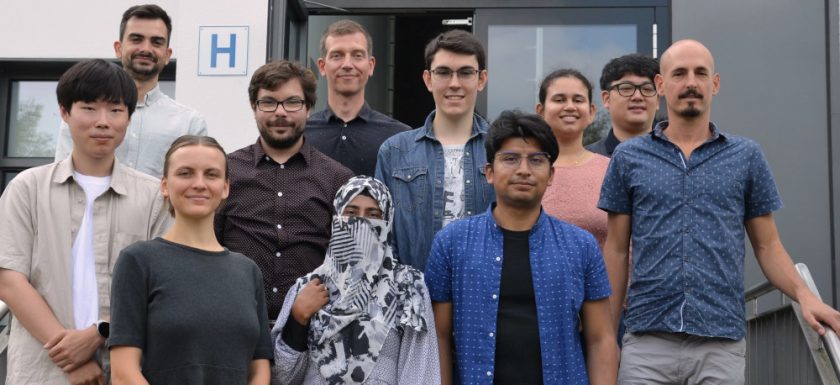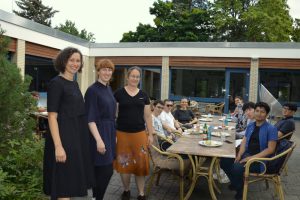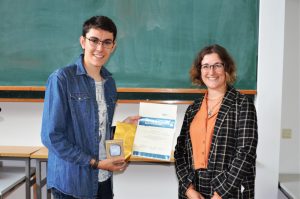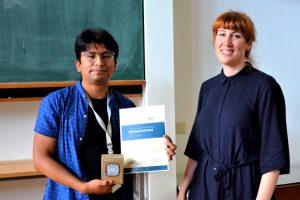
After two years of interruption due to the Corona pandemic, HZB finally hosted summer students again this summer. They came from Pakistan, Colombia, Spain, USA, and Korea. Five students, eager to work on a research project at HZB for eight weeks. To make it happen, several HZB colleagues have been involved. In the end, the HZB team even organised a small but real science conference – with flash talks and poster sessions and awards. A look behind the scenes of the International Summer Student Programme – ISSP.
“It’s an extensive project, which we have to manage alongside our many other tasks,” says Cécile Dufloux, who coordinated the international summer student programme. “We have therefore divided up the many tasks.” The program was jointly organized by the Directors’ Office (GF-GB) and the Human Resources Department (A-PS). The complex administrative tasks were handled by Arian Klose and Jennifer Schevardo from the A-PS. Ana Anselmo and Marieke Hoog Antink from the GF-GB joined Cécile in coordinating the other aspects of the program. Applications from all over the world came in great number. The first hurdle was to select the candidates who would fit well into the programme.
Projects, candidates, visa requirements: a marathon process

The next hurdle was to find suitable projects, and match them with candidates. Ana managed this process. “It was actually not so easy this year to find enough projects. Some of the researchers who usually supervise summer students were not available during the summer period or did not have the capacity to host a student this year, maybe linked to the corona interruptions in lab work”, she says. The scientists can choose someone from the candidate pool who is suitable for the task. “It’s actually a win-win situation,” says Ana: “The group leaders can delegate a small work package to the student and the student gets a first real experience in a modern lab.”
Then Arian took over: For students from non-European countries, HZB has to request a certificate from the Central International Placement Office of the German Federal Employment Agency. It may be a formality, but this year the process took a full twelve weeks instead of the usual eight. “I wrote endless emails and called constantly, but kept getting referred to new people” recalls Arian. It wasn’t until the end of June that the admission letters arrived. The actual application for a visa could start only then. That was very close.
Great results, presented via flash talks and poster session

The programme itself was a great success. Cécile organised several excursions, to Telegrafenberg in Potsdam and to other institutions. The students were able to attend two workshops, one on science communication and one on technology transfer. And of course they threw themselves into their work. And at the closing event, they were able to show what they had worked on in short flash talks and at a poster session.

At the end of the programme, the feedback from all sides was very positive. “I just heard good things, people were really happy”, Marieke says, who took care of the communication. She also wants to keep in touch with the students. “Some of them will come back, either to do a doctorate or a postdoc, or someone in their environment will want to apply to HZB.”
Fostering the next generation:
“With this programme we want to foster the young generation of scientists and at the same time increase the visibility of HZB abroad,” says Ana. For some of these young people it was the first time outside their home country – and maybe not the last. It might be the start of a great career.
Tipp: The summer students have reported on their experience in this blog. It was part of their science communication training and their contributions make a good read, original, sincere and helpful for the next generation of students.

Great science and great people! Thanks to all who contributed to the organization!! It was great to be a part of this, and am looking forward to next year.